最新版新目标八年级英语下册单元知识点归纳
- 格式:doc
- 大小:126.50 KB
- 文档页数:16
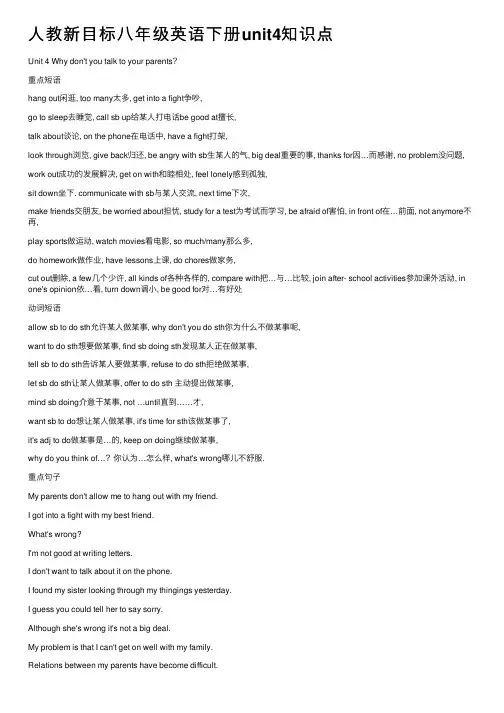
⼈教新⽬标⼋年级英语下册unit4知识点Unit 4 Why don't you talk to your parents?重点短语hang out闲逛, too many太多, get into a fight争吵,go to sleep去睡觉, call sb up给某⼈打电话be good at擅长,talk about谈论, on the phone在电话中, have a fight打架,look through浏览, give back归还, be angry with sb⽣某⼈的⽓, big deal重要的事, thanks for因…⽽感谢, no problem没问题, work out成功的发展解决, get on with和睦相处, feel lonely感到孤独,sit down坐下. communicate with sb与某⼈交流, next time下次,make friends交朋友, be worried about担忧, study for a test为考试⽽学习, be afraid of害怕, in front of在…前⾯, not anymore不再,play sports做运动, watch movies看电影, so much/many那么多,do homework做作业, have lessons上课, do chores做家务,cut out删除, a few⼏个少许, all kinds of各种各样的, compare with把…与…⽐较, join after- school activities参加课外活动, in one's opinion依…看, turn down调⼩, be good for对…有好处动词短语allow sb to do sth允许某⼈做某事, why don't you do sth你为什么不做某事呢,want to do sth想要做某事, find sb doing sth发现某⼈正在做某事,tell sb to do sth告诉某⼈要做某事, refuse to do sth拒绝做某事,let sb do sth让某⼈做某事, offer to do sth 主动提出做某事,mind sb doing介意⼲某事, not …until直到……才,want sb to do想让某⼈做某事, it's time for sth该做某事了,it's adj to do做某事是…的, keep on doing继续做某事,why do you think of…?你认为…怎么样, what's wrong哪⼉不舒服.重点句⼦My parents don't allow me to hang out with my friend.I got into a fight with my best friend.What's wrong?I'm not good at writing letters.I don't want to talk about it on the phone.I found my sister looking through my thingings yesterday.I guess you could tell her to say sorry.Although she's wrong it's not a big deal.My problem is that I can't get on well with my family.Relations between my parents have become difficult.I don't know if I should say anything to them about this.When they argue, it's like a big black cloud, hanging over our home.Although my elder brother is not very nice to me.Instead he watches whatever he wants until late at night.At home I feel lonely and nervous.If your parents are having problems you should offer to help.Maybe you could do more jobs around the house, so that they have more time for proper communication. Secondly , why don't you sit down and communicate with your brother?You should explain that you don't mind him watching TV all the time.My cousin borrows my things without returning them.You left your homework at home.You're afraid of speaking in front of people.Your best friend, doesn't trust you anymore.The Taylors are a typical American family.Maybe I could cut out a few of their activities.I really want them to be successful.However the tired children don't get home until after 7:00 p.m.They have a quick dinner,then it's time for homework.In some families, competition starts very young and continues until the kids get older.And they are always comparing them with other children.It's crazy.People shouldn't push their kids so hard.Doctor says too much pressure is not good for a child's development.Doctor Alice Green says all these activities can cause a lot of stress for children.重点1.allow sb to do sth允许某⼈做某事allow sth允许某事allow doing sth 允许做某事be allowed to do sth被允许做某事The doctor allowed him to take a short walk every day.I don't think she will allow it.We don't allow smoking in our house.We are not allowed to throw rubbish everywhere.2.Get into a fight with sb=Have a fight with sb.=fight with sb.和某⼈打架We can't get into a fight with each other at school.3.What's wrong?=what's the matter?询问某⼈有什么问题,有什么不顺⼼的事,询问某物出了什么⽑病?What's wrong?I left my bag on the bus.What's wrong with your finger?There is something wrong with my bike.Your answer is wrong but hers is right.4.Be good at擅长⼲某事, be good for对…有益be good to对…好be good with善于应付…的.He is good at drawing.Drink more water is good for you.She is very good to her neighbors.He's very good with children.5.On the phone⽤电话交谈, on the Internet 通过互联⽹on the radio.通过收⾳机What did you say on the phone?He is chatting on the Internet.6、Look through查看,浏览, look after照顾. Look at看着, look for寻找,look out of向…外看, look forward to doing.盼望⼲某事The through the passage quickly and answer the questions.7.I guess +宾语从句(变否定句时,否定要前移)I guess that he's right.I don't guess that he is right.8.Say sorry /hello /thanks/ goodbye to sb.向某⼈抱歉/问候/感谢/道别。
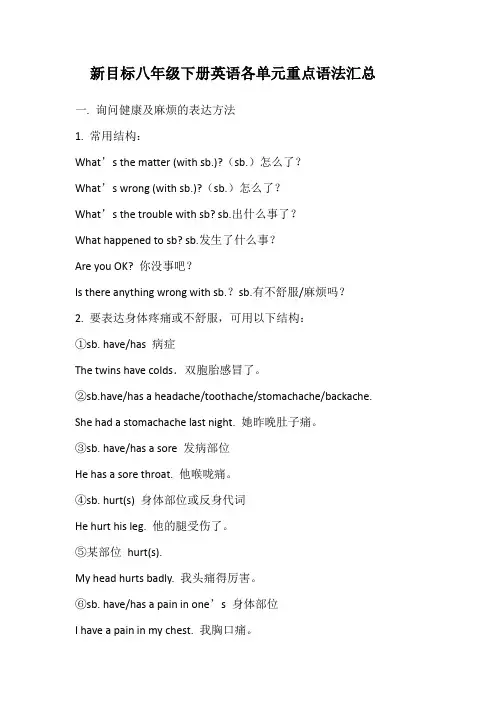
新目标八年级下册英语各单元重点语法汇总一. 询问健康及麻烦的表达方法1. 常用结构:What’s the matter (with sb.)?(sb.)怎么了?What’s wrong (with sb.)?(sb.)怎么了?What’s the trouble with sb? sb.出什么事了?What happened to sb? sb.发生了什么事?Are you OK? 你没事吧?Is there anything wrong with sb.?sb.有不舒服/麻烦吗?2. 要表达身体疼痛或不舒服,可用以下结构:①sb. have/has 病症The twins have colds.双胞胎感冒了。
②sb.have/has a headache/toothache/stomachache/backache. She had a stomachache last night. 她昨晚肚子痛。
③sb. have/has a sore 发病部位He has a sore throat. 他喉咙痛。
④sb. hurt(s) 身体部位或反身代词He hurt his leg. 他的腿受伤了。
⑤某部位hurt(s).My head hurts badly. 我头痛得厉害。
⑥sb. have/has a pain in one’s 身体部位I have a pain in my chest. 我胸口痛。
⑦(There is) something wrong with one’s 身体部位There is something wrong with my right eye. 我的右眼有毛病。
⑧其他表达方式She has a heart trouble. 她有心脏病。
He got hit on the head. 他头部受到了撞击。
She cut her finger. 她割破手指了。
二.情态动词should1. should为情态动词,意为“应该;应当”,否定式为shouldn’t,其后接动词原形,无人称和数的变化。
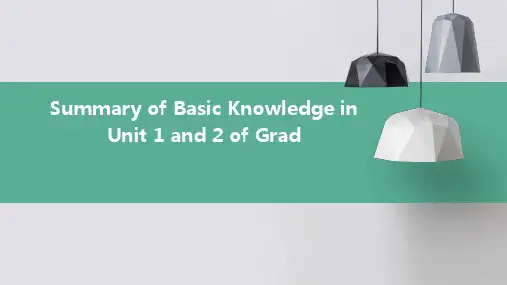
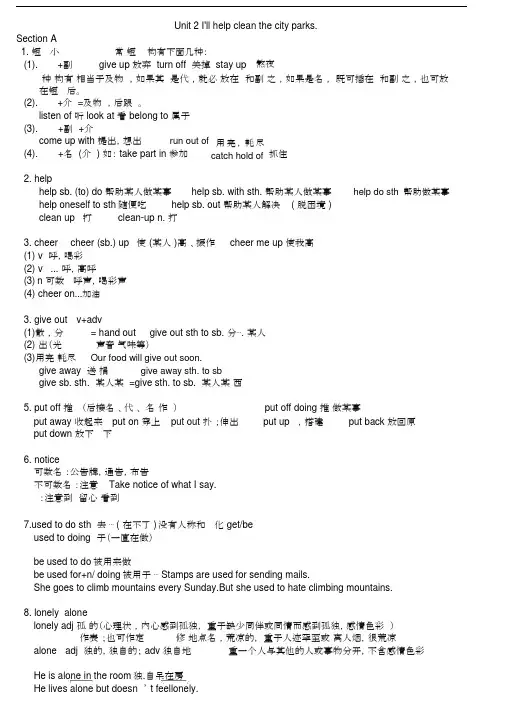
Unit 2 I'll help clean the city parks.Section A1. 短小常短构有下面几种:(1).+副give up 放弃 turn off 关掉 stay up 熬夜种构有相当于及物,如果其是代,就必放在和副之,如果是名,既可插在和副之,也可放在短后。
(2).+介 =及物,后跟。
listen of 听 look at 看 belong to 属于(3).+副 +介come up with 提出,想出run out of (4).+名 (介 ) 如: take part in 参加用完,耗尽catch hold of 抓住2. helphelp sb. (to) do 帮助某人做某事help sb. with sth. 帮助某人做某事help oneself to sth随便吃help sb. out 帮助某人解决 (脱困境 )clean up打clean-up n. 打help do sth 帮助做某事3. cheer cheer (sb.) up使(某人)高、振作cheer me up 使我高(1)v 呼,喝彩(2)v ...呼,高呼(3)n 可数呼声,喝彩声(4)cheer on...加油3. give out v+adv(1)散,分= hand out give out sth to sb. 分⋯. 某人(2)出(光声音气味等)(3)用完耗尽Our food will give out soon.give away 送捐give away sth. to sbgive sb. sth. 某人某 =give sth. to sb. 某人某西5. put off 推(后接名、代、名作)put away 收起来put on 穿上put out 扑;伸出put down 放下下put off doing 推做某事put up ,搭建put back 放回原6.notice可数名:公告牌,通告,布告不可数名:注意 Take notice of what I say.:注意到留心看到ed to do sth 去⋯ (在不了 )没有人称和化get/beused to doing于(一直在做)be used to do被用来做be used for+n/ doing被用于⋯ Stamps are used for sending mails.She goes to climb mountains every Sunday.But she used to hate climbing mountains.8.lonely alonelonely adj 孤的(心理状,内心感到孤独,重于缺少同伴或同情而感到孤独,感情色彩)作表;也可作定修地点名,荒凉的,重于人迹罕至或离人烟,很荒凉alone adj 独的,独自的; adv 独自地重一个人与其他的人或事物分开,不含感情色彩He is alone in the room独.自呆在房He lives alone but doesn ’ t feellonely.9. volunteer(1)可数名词志愿者(2)adj. 自愿的(3) v volunteer to do sth 志愿效劳、主动贡献They are the Chinese People olunteers’V. 他们是中国人民志愿军。
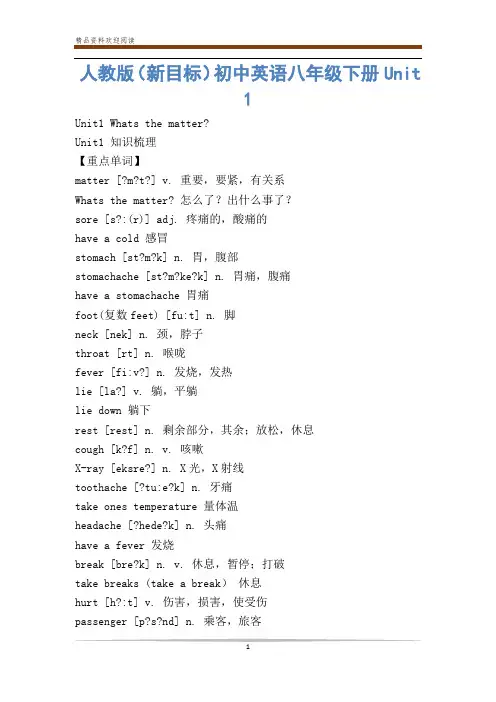
人教版(新目标)初中英语八年级下册Unit1Unit1 Whats the matter?Unit1 知识梳理【重点单词】matter [?m?t?] v. 重要,要紧,有关系Whats the matter? 怎么了?出什么事了?sore [s?:(r)] adj. 疼痛的,酸痛的have a cold 感冒stomach [st?m?k] n. 胃,腹部stomachache [st?m?ke?k] n. 胃痛,腹痛have a stomachache 胃痛foot(复数feet) [fu:t] n. 脚neck [nek] n. 颈,脖子throat [rt] n. 喉咙fever [fi:v?] n. 发烧,发热lie [la?] v. 躺,平躺lie down 躺下rest [rest] n. 剩余部分,其余;放松,休息cough [k?f] n. v. 咳嗽X-ray [eksre?] n. X光,X射线toothache [?tu:e?k] n. 牙痛take ones temperature 量体温headache [?hede?k] n. 头痛have a fever 发烧break [bre?k] n. v. 休息,暂停;打破take breaks (take a break)休息hurt [h?:t] v. 伤害,损害,使受伤passenger [p?s?nd] n. 乘客,旅客off [?f] adv. prep. 离开(某处);从去掉get off 下车to ones surprise 使惊讶,出乎意料onto [nt?] prep. 向,朝trouble [?tr?bl] n. 麻烦,烦扰,问题hit [hit] n. v. 碰撞,打,打击right away 立即,马上get into 陷入,参与herself [h?:?self] pron. 她自己,她本身(she的反身代词)bandage [b?nd?d?] n. v. 绷带;用绷带包扎sick [s?k] adj. 患病的,不适的knee [ni:] n. 膝盖nosebleed [?nzbli:d] n. 鼻出血breathe [bri:e] v. 呼吸sunburned [?s?nb?:nd] adj. 晒伤的ourselves [ɑ:?selvz] pron. 我们自己(we的反身代词)climber [?kla?m?(r)] n. 登山者be used to 习惯于适应于risk [r?sk] n. v. 风险,危险;冒险take risks (take a risk) 冒险accident [ksid?nt] n. 意外事件;事故situation [?sitju?ein] n. 状况,形式,情况kg=kilogram [?k?l?gr?m] n. 公斤,千克rock [r?k] n. 岩石run out (of) 用尽,耗尽knife [naif] n. 刀,餐刀cut off 切除blood [bl?d] n. 血mean [mi:n] v. 意味着,意思是,意欲get out of 离开,从出来importance [?m?p?:tns] n. 重要性decision [d?sn] n. 决心,决定,抉择control [k?ntrl] v. 控制,支配,操纵be in control of 掌管,管理spirit [sp?r?t] n. 勇气,意志death [de] n. 死亡give up 放弃nurse [n?:s] n. 护士【重点短语】1.have a fever 发烧2.have a cough 咳嗽3.have a toothache 牙疼4.talk too much 说得太多5.drink enough water 喝足够的水6.have a cold 受凉;感冒7.have a stomachache 胃疼8.have a sore back 背疼9.have a sore throat 喉咙痛10. take risks 冒险11.hot tea with honey 加蜂蜜的热茶12.see a dentist 看牙医13.get an X-ray 拍X 光片14.take one s temperature 量体温15.put some medicine on sth. 在上面敷药16. give up 放弃17. sound like 听起来像18. all weekend 整个周末19. in the same way 以同样的方式20. go to a doctor 看医生21. go along 沿着走22. on the side of the road 在马路边23. shout for help 大声呼救24. without thinking twice 没有多想25. get off 下车26. have a heart problem 有心脏病27. to one s surprise 另某人惊讶的是28. thanks to 多亏了;由于29. in time 及时30. make a decision 做出决定31. get into trouble 造成麻烦32. right away 立刻;马上33. because of 由于34. get out of 离开;从出来35. keep on doing sth. 继续或坚持做某事36. put a bandage on sth. 用绷带包扎37. fall down 摔倒38. feel sick 感到恶心39. have a nosebleed 流鼻血40. cut his knee 割伤他的膝盖41. put her head back 把她的头向后仰42. have problems breathing 呼吸困难43. mountain climbing 登山运动44. be used to doing sth. 习惯做某事45. run out (of) 用完;用尽46. so that 以便47. so...that... 如此以至于...48. be in control of 掌管;管理49. in a difficult situation 在闲境中【重点句型】1. Whats the matter with you?= Whatthe trouble with you?= Whats wrong with you? 你怎么了?2. What should she do? 她该怎么办呢?3.Should I take my temperature? 我应该量一下体温吗?4.You should lie down and rest. 你应该躺下休息一会儿。
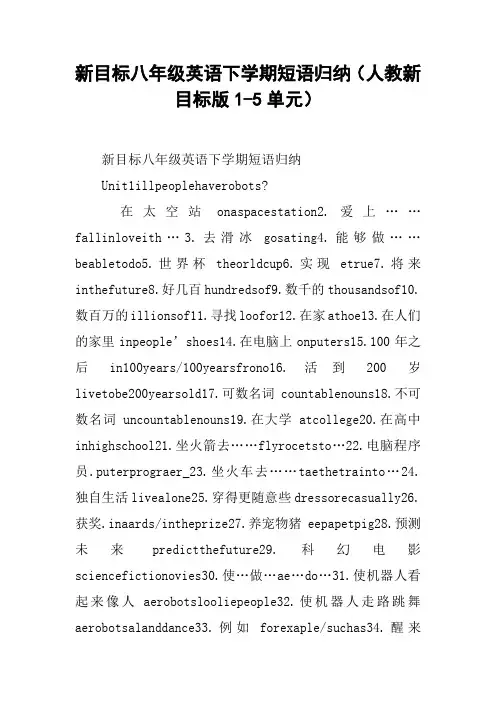
新目标八年级英语下学期短语归纳(人教新目标版1-5单元)新目标八年级英语下学期短语归纳Unit1illpeoplehaverobots?在太空站onaspacestation2.爱上……fallinloveith…3.去滑冰gosating4.能够做……beabletodo5.世界杯theorldcup6.实现etrue7.将来inthefuture8.好几百hundredsof9.数千的thousandsof10.数百万的illionsof11.寻找loofor12.在家athoe13.在人们的家里inpeople’shoes14.在电脑上onputers15.100年之后in100years/100yearsfrono16.活到200岁livetobe200yearsold17.可数名词countablenouns18.不可数名词uncountablenouns19.在大学atcollege20.在高中inhighschool21.坐火箭去……flyrocetsto…22.电脑程序员.puterprograer_23.坐火车去……taethetrainto…24.独自生活livealone25.穿得更随意些dressorecasually26.获奖.inaards/intheprize27.养宠物猪eepapetpig28.预测未来predictthefuture29.科幻电影sciencefictionovies30.使…做…ae…do…31.使机器人看起来像人aerobotslooliepeople32.使机器人走路跳舞aerobotsalanddance33.例如forexaple/suchas34.醒来aeup35.把…弄醒aesbup36.有…在做…37.简单的工作siplejobs38.反反复复overandoveragain39.感到无聊getbored/feelbored/bebored40.某人或某物是无聊的sb/sthbeboring41.不同的外型differentshapes42.和…一样thesaeas…43.帮助做…helpdosth/helptodosth/helpithsth44.做某事花费某人…时间Ittaessbsoetietodosth45.某人花费时间做某事sbspendsoetie/oneydoingsth=sbspendtie/oneyonsth46.某物花费某人多少钱sthcostsboney47.某人买某物花了多少钱sbpayoneyforsth=sbbuysthforoneUnit2hatshouldIdo?不让….进入eepout2.同…争吵argueith/haveanarguentith3.怎么了?hat’srong?=hat’stheproble?=hat’stheatter?4.不时髦的,过时的outofstyle=outoffashion5.时髦的,流行的instyle=infashion6.用电话交谈talonthephone7.打电话给…callsbup8.付款payfor9.兼职工作part-tiejob10.青少年论坛teental11.相处,进展geton12.与…相处的好getonellith13.尽可能…as…aspossible14.各种allindsof15.一方面ontheonehand16.另一方面ontheotherhand17.呆在家里stayhoe=stayathoe18.想要做某事anttodosth=ouldlietodosth=feelliedoingsth19.给某人写信ritetosb=ritealettertosb20.一张足球比赛的票aticettoaballgae/aticetforaballgae21.足够的钱enoughoney22.足够大bigenough23.令某人惊奇surprisesb24.某人感到惊奇sbbesurprised25.惊奇地insurprise26.需要做….needtodosth27.从…借…borrosthfrosb28.借…给…lendsthtosb29.借某物一周eepsthforaee30求助向…要…asfor31向某人要什么.assbforsth32.询问某人某事assbaboutsth33.叫某人不要做某事assbnottodosth34叫某人做某事assbtodosth35.卖烧烤haveabaesale36.为某人买礼物buygiftsforsb=buysbsth37.列…的清单aealistof...38.请家庭教师getatutor39.发现findout40.为…筹划生日聚会planabirthdaypartyforsb41.把…忘在家里forgetsthathoe42.像…belie…43.尽力风趣些trytobefunny44.邀请某人做…invitesbtodosth45.对某人生气beangryithsb/getangryithsb/beadatsb/getadatsb/beann oyedithsb/getannoyedith46.考试失败failthetest47.和某人相同年龄bethesaeageas48.和某人吵架打架haveafightithsb49.给某人提建议givesbsoeadvice/givesbsoesuggestions50.带某人去做某事taesbtodosth51.带某人去某处taesbto…52.直到…才…not…until…53.快速吃完早餐haveaquicbreafast54.泰勒一家theTaylors=theTaylorfaily55.适应某人的生活fitintoone’slife56.压力很大beunderuchpressure/beundergreatstress/bestressedout 57.抱怨某人/某事plainaboutsb/sth58.到了做某事的时候了It’stieforsth=It’stietodosth=It’stiefordoingsth59.看见某人在做….seesbdoingsth60.送….去….sendsbto…61.把…和…比较pare…ith…62.发现做….困难finditdifficulttodosth63.多一点的时间abitoretie64我自己的发型yonhaircutUnit3hatereyoudoinghentheUFoarrived?理发店barbershop2.出去getout3.起飞taeoff4.火车站trainstation5.进来ein6.北京国际机场BeijingInternationalAirport7.听说hearof/hearabout8.发生taeplace9.世界贸易中心orldTradecenter10.像…一样as…as11.站在图书馆前standinfrontofthelibrary12.坐在公共汽车的前面sitinthefrontofthebus13.睡懒觉sleeplate14.熬夜stayup/situp15.制作奶昔aeailshae16.做晚饭aedinner17.从…出来getoutof…18.航空博物馆theuseuofFlight19.沿着街道走aldonthestreet20.报警callthepolice21.不同寻常的经历haveanunusualexperience22.轮流做….taeturndoingsth=taeturntodosth=dosthinturn23.从树上跳下来jupdonfrothetree24.爬上树goupthetree25.照相taeaphoto26.跑开runaay27.拥挤的becroded28.在车站外面outsidethestation29.最后atlast=intheend=finally30.在医务室atthedoctor’s=atthedoctor’sroo31.在理发店inthebarbershop=atthebarber’s32.看望住院的阿姨visitauntinhospital33.历史上inhistory34.最重要的事件之一oneoftheostiportantevents35.在美国的现代历史上inodernAericanhistory36.日常活动everydayactivities37.在那时atthattie38.10分钟以前teninutesago39.10分钟之后teninuteslater40.9点以前before9o’cloc41.9点之后after9o’cloc42.静静地走回家alhoeinsilence43.被某人破坏bedestroyedby…44.在太空inspace45.民族英雄anationalhero46.全世界allovertheorld/allaroundtheorld/acrosstheorld47.出名befaous/beefaous48.次thefirsttie.Unit4HesaidIashardoring.直接引语directspeech2.间接引语reportedspeech3.首先firstofall4.传递passon5.被期望或被要求…besupposedtodo…6.在…方面做得好/擅长做…doellin…/begoodat…7.身体健康beingoodhealth8.成绩单reportcard9.克服,恢复,原谅getover10.教育部theinistryofEducation11.中国少年先锋队chineseyoungPioneer12.海平面sealevel13.打开openup14.照料carefor15.勤学的学生/懒惰的学生ahard-oringstudent/alazystudent16.努力学习/工作orhard17.艰难的工作hardor18.在肥皂剧里onsoapoperas19.为…举行惊喜晚会haveasurprisepartyfor20.在星期五晚上onFridaynight21.不再…not…anyore22.带…来bring…to…23.拿…走tae…to…24.去海滩gotothebeach25.令人兴奋的一周anexcitingee26.在家beathoe/bein27.在某人的家里做某事beatone’shoedoingsth28.演算,制定oron29.听到那事我很难过I’sorrytohearthat30.感冒haveacold/catchacold31.年终考试end-of-yearexa32.紧张benervous/feelnervous/getnervous33.学科学很吃力haveahardtieithscience=haveahardtiestudyingscience3 4.发现科学课很困难findsciencverydifficult35.另一个令人失望的结果anotherdisappointingresult36.假装是…pretendtobe…37.抄别人的作业copyothers’hoeor38.对某事有把握besureofsth39.相信/确信…besure/certainthat+从句40.在一个贫穷的山村里inapoorountainvillage41.听起来像是有趣的事soundliefun42.由…发起bestartedby43.在中国的边远地区inchina’sruralareas44.海拔XX米XXetersabovesealevel45.使某人感觉不舒服aesbfeelsic46.一天三次threetiesaday47.同意某人agreeithsb48.两者都…both…and…49.在学校宿舍inschooldoritories50.在…和…之间beteen…and…51.感到幸运feellucy52.高中seniorhighschoolsenioriddleschool53.初中juniorhighschooljunioriddleschool54.给某人一个好的起点givesbagoodstart55.回到…returnto…/getbacto/gobacto…/ebacto…56.当数学老师orasaathteacherUnit5.Ifyougototheparty,you’llhaveagreattie!去参加聚会gototheparty2.玩得高兴haveagood/nice/onderful/greattie3.乘坐公共汽车去…taethebusto…4.班上一半的学生halftheclass5.超过,多于orethan=over6.想要某人做某事antsbtodosth/ouldliesbtodosth7.拿走taeaay8.在聚会期间duringtheparty9.老人之家oldpeople’shoe10.学校大扫除schoolclean-up11.儿童医院children’shospital12.去老人之家看望gototheoldpeople’shoe13.旅行全世界travelaroundtheorld14.上大学gotocollege15.挣钱aeoney16.受教育getaneducation17.成为专业的足球队员beeaprofessionalplayer18.似乎是梦想的工作seelieadreajob19.靠做某事谋生aealivingdoingsth20.一直allthetie=alays21.到处跟着你folloyoueveryhere22.受伤getinjured23.成为专业的运动员beeaprofessionalathlete24.很难知道haveadifficulttiedoingsth25.实际上infact26.赞同…的理由reasonsfor…27.反对…的理由reasonsagainst…28.决定做…decidetodosth29.所给的单词theordsgiven30.用…造句aesentencesith…31.和…一起度过时间spendtieithsb32.嘲笑…laughat…33.当心becareful/looout/atchout34.幸运色alucycolor35.看见某人做某事seesbdosth。
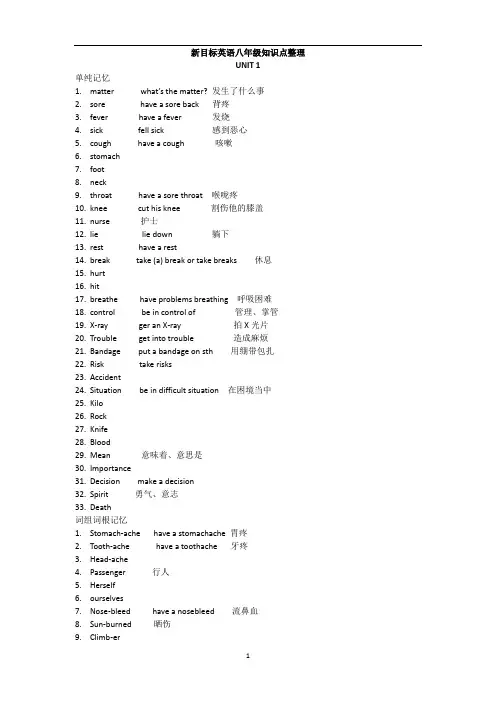
新目标英语八年级知识点整理UNIT 1单纯记忆1.matter what’s the matter? 发生了什么事2.sore have a sore back 背疼3.fever have a fever 发烧4.sick fell sick 感到恶心5.cough have a cough 咳嗽6.stomach7.foot8.neck9.throat have a sore throat 喉咙疼10.knee cut his knee 割伤他的膝盖11.nurse 护士12.lie lie down 躺下13.rest have a rest14.break take (a) break or take breaks 休息15.hurt16.hit17.breathe have problems breathing 呼吸困难18.control be in control of 管理、掌管19.X-ray ger an X-ray 拍X光片20.Trouble get into trouble 造成麻烦21.Bandage put a bandage on sth 用绷带包扎22.Risk take risks23.Accident24.Situation be in difficult situation 在困境当中25.Kilo26.Rock27.Knife28.Blood29.Mean 意味着、意思是30.Importance31.Decision make a decision32.Spirit 勇气、意志33.Death词组词根记忆1.Stomach-ache have a stomachache 胃疼2.Tooth-ache have a toothache 牙疼3.Head-ache4.Passenger 行人5.Herself6.ourselves7.Nose-bleed have a nosebleed 流鼻血8.Sun-burned 晒伤9.Climb-er介词短语1.off 离开、不工作、从……去掉get off 下车cut off 切除2.right away 立刻、马上3.into get into陷入、参与4.out run out (of) 用尽/耗尽get out of 离开、从……出来5.up give up放弃词组1.be used to doing 习惯做某事2.drink enough water 喝足够多的水3.hot tea with honey 加蜂蜜的热茶4.see a dentist5.take one’s temperature 量体温6.put some medicine on sth 在……敷药7.sound like 听起来像8.all weekend9.in the same way10.go to a doctor11.go along 沿着……走12.on the side of the road13.shout for help 大声呼救14.without thinking twice 没有多想15.have a heart problem 有心脏病16.to one’s surprise17.thanks to18.in time19.right away 立刻、马上20.because of21.keep on doing sth22.fall down 摔倒23.put her head back 把她的头往后仰24.mountain climbing 登山运动25.so that 以便26.so…that…如此……以至于……重点句型1.what’s the matter with you ?=what’s the trouble with you?=what’s wrong with you?你怎么了2.What should she do? 她应该怎么办?What can you do ? 你可以做什么?3.Should I take my temperature? 我需要量体温吗?Can I play the call? 我可以玩那个球吗?4.You should lie down and rest 你应该躺下来休息一下5.Do you think it comes from a newspaper or a book? 你认为它是来自报纸还是书?6.I think I sat in the same way for too long without moving.我想我以同样的姿势一动不动地坐得太久了。
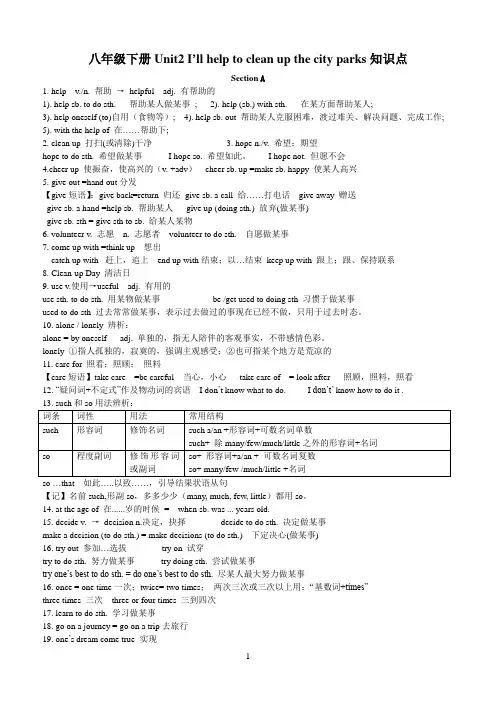
八年级下册Unit2 I’ll help to clean up the city parks知识点Section A1. help v./n. 帮助→helpful adj. 有帮助的1). help sb. to do sth. 帮助某人做某事; 2). help (sb.) with sth. 在某方面帮助某人;3). help oneself (to)自用(食物等); 4). help sb. out 帮助某人克服困难,渡过难关、解决问题、完成工作;5). with the help of 在……帮助下;2. clean up 打扫(或清除)干净3. hope n./v. 希望;期望hope to do sth. 希望做某事I hope so. 希望如此。
I hope not. 但愿不会4.cheer up 使振奋,使高兴的(v. +adv)cheer sb. up =make sb. happy 使某人高兴5. give out =hand out分发【give短语】:give back=return 归还give sb. a call 给……打电话give away 赠送give sb. a hand =help sb. 帮助某人give up (doing sth.) 放弃(做某事)give sb. sth = give sth to sb. 给某人某物6. volunteer v. 志愿n. 志愿者volunteer to do sth. 自愿做某事7. come up with =think up 想出catch up with 赶上,追上end up with结束;以…结束keep up with 跟上;跟、保持联系8. Clean-up Day 清洁日9. use v.使用→useful adj. 有用的use sth. to do sth. 用某物做某事be /get used to doing sth 习惯于做某事used to do sth 过去常常做某事,表示过去做过的事现在已经不做,只用于过去时态。
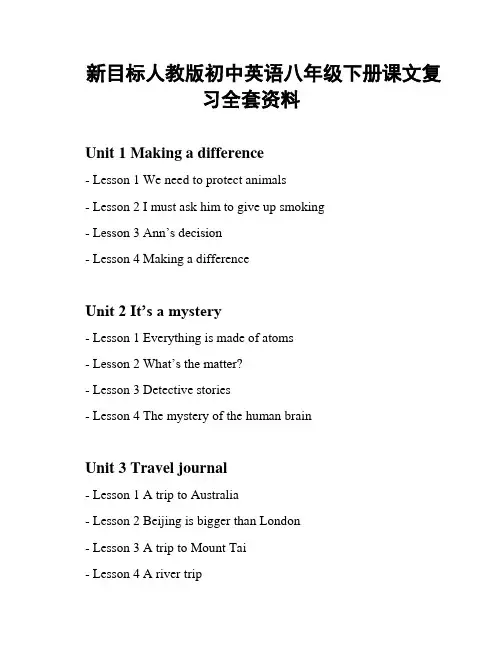
新目标人教版初中英语八年级下册课文复习全套资料Unit 1 Making a difference- Lesson 1 We need to protect animals- Lesson 2 I must ask him to give up smoking- Lesson 3 Ann’s decision- Lesson 4 Making a differenceUnit 2 It’s a mystery- Lesson 1 Everything is made of atoms- Lesson 2 What’s the matter?- Lesson 3 Detective stories- Lesson 4 The mystery of the human brainUnit 3 Travel journal- Lesson 1 A trip to Australia- Lesson 2 Beijing is bigger than London- Lesson 3 A trip to Mount Tai- Lesson 4 A river tripUnit 4 Music- Lesson 1 Sounds of music- Lesson 2 We’re trying to find a boy band- Lesson 3 A famous orchestra- Lesson 4 Music in our heartsUnit 5 Amazing stories- Lesson 1 A greener future- Lesson 2 I used to be afraid of the dark- Lesson 3 Pygmalion- Lesson 4 Amazing sports storiesUnit 6 Films and TV programmes- Lesson 1 TV programmes- Lesson 2 What’s on?- Lesson 3 Jurassic Park- Lesson 4 Harry Potter and the Philosopher's StoneUnit 7 Teenagers should be allowed to choose their own clothes- Lesson 1 Children should be allowed to grow up freely- Lesson 2 Uniforms or casual clothes?- Lesson 3 Different styles- Lesson 4 Fashion and societyUnit 8 Helping others- Lesson 1 Offering help- Lesson 2 First aid- Lesson 3 Volunteers- Lesson 4 A charity show这份全套资料包含了新目标人教版初中英语八年级下册的每个单元以及它们各自包含的四节课。
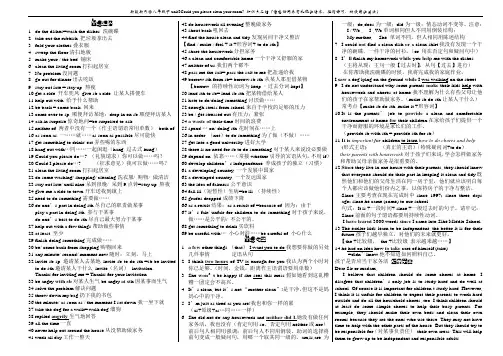
新版新目标八年级下unit3Could you please clean your room? 知识点总结(情态动词表有礼貌的请求,征询许可,祈使句的用法)重点短语1.do the dishes=wash the dishes 洗碗碟2.take out the rubbish 把垃圾拿出去3.fold your clothes叠衣服4.sweep the floor清扫地板5.make your / the bed 铺床6.clean the living room打扫起居室7.No problem.没问题8.go out for dinner.出去吃饭9.stay out late = stay up 熬夜10.g et a ride 开车兜风give sb a ride 让某人搭便车11.h elp out with 给予什么帮助12.b e back = come back 回来13.c ome over to sp 顺便拜访某地;drop in on sb顺便拜访某人14.a sk in surprise惊奇地问=be surprised to ask15.n either of 两者中没有一个(作主语谓语常用单数)--both of16.a s soon as 一……就……as soon as possible尽可能快17.g et something to drink/ eat弄些喝的东西18.h ang out with…同……一起闲逛(hang 过去式hung)19.C ould you please do…? (礼貌请求)你可以做……吗?20.C ould I please do…? (征求意见)我可以做……吗?21.c lean the living room打扫起居室22.d o some washing/ shopping/ cleaning洗衣服/ 购物/ 做清洁23.s tay out late/ until nine呆到很晚/ 呆到9点钟=stay up 熬夜24.g ive me a ride to town开车送我到镇上25.n eed to do something需要做……26.d o one’s part in doing sth尽自己的职责做某事play a part in doing sth 参与干某事do one’s best to do sth尽自己最大努力干某事27.h elp out with a few things帮助做些事情28.a t least 至少29.f inish doing something完成做……30.b e/ come back from shopping购物回来31.a ny minute/ second/ moment now随时;立刻,马上32.i nvite sb sp 邀请某人去某地invite sb to do sth =sb be invitedto do sth邀请某人干什么invite(名词)invitationThanks for inviting me.= Thanks for your invitation.33.b e angry with sb对某人生气be angry at st h因某事而生气34.s olve the problem解决问题35.t hrow down my bag扔下我的书包36.t he minute/ as soon as / the moment I sat down我一坐下就37.t ake the dog for a walk= walk dog溜狗38.r eplied angrily生气地回答39.a ll the time一直40.n ever help out around the house从没帮助做家务41.w ork all day工作一整天42.d o housework all evening整晚做家务43.s hout back吼回去44.f ind the house clean and tidy发现房间干净又整洁【find / make / feel + it +形容词+ to do sth】45.s hare the housework分担家务46.a clean and comfortable home一个干净又舒服的家47.n either of us我们两个都不48.p ass me the salt= pass the salt to me把盐递给我49.b orrow sth from sb= borrow sb sth.从某人那里借某物【borrow 的持续性动词为keep –过去分词kept】50.l end sth to sb= lend sb sth把某物借给某人51.h ate to do/doing something讨厌做……52.e nough stress from school来自于学校的足够的压力53.b e / get stressed out有压力;紧张54.a waste of their time时间的浪费55.s pend … on/ doing sth花时间在……上56.i n order (not)to do something为了做(不做)……57.g et into a good university进好大学58.t here is no need for sb to do something对于某人来说没必要做59.d epend on 依靠……(常接whether引导的宾语从句,不用if)60.d evelop children’s independence 养成孩子的独立(习惯)61.a developing country 一个发展中国家62.a developed country 一个发达国家63.t he idea of fairness公平意识64.f all ill(短暂性)生病=be ill (持续性)65.g rades dropped成绩下降66.a s a result结果;as a result of =because of 因为;由于67.i t’s fair/ unfair for children to do something对于孩子来说,做……是公平的/ 不公平的。
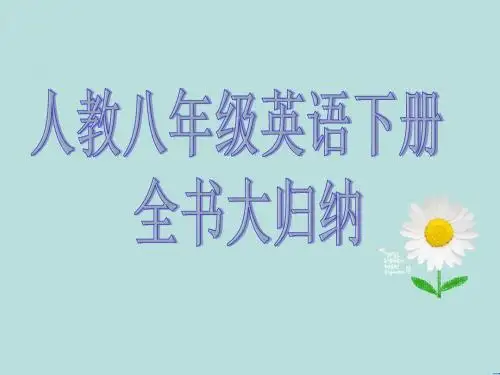
Unit 10 I ’ve had this bike for three years.课文重难点讲解Section A1. I ’ve had it for three years. 我拥有它三年了。
【解析】for + 一段时间表示动作持续一段时间,用于现在完成时【甘肃鸡西市1】She her hometown for many years. No one nearly knows her.A. has been away fromB. has leftC. had left【湖北十堰2】Ben is a foreign teacher. So far, he in Shiyan for five years.A. was teachingB. has taughtC. will teachD. taught2.Amy wants to keep h er old things because theybring back sweet memories.艾米想保留她的那些旧东西,因为它们能使她想起甜蜜的回忆。
【解析1】keep (kept ; kept )保留keep 用法归纳如下:一、用作系动词,意为“保持(某种状态)”,其后常接形容词作表语。
Please keep quiet / silent! 请保持安静!二、用作实义动词,⑴. 保管;保存;保留Please keep these things for me while I am away.⑵. 赡养;饲养I used to keep sheep in my childhood.⑶坚持;继续接V-ing 形式作宾语。
If you keep practicing your spoken English, you'll soon make great progress.⑷阻止;阻碍keep sb/sth from doing sth 其中介词from 不能省略。
Unit 9知识点梳理和单元复习附参考答案1. 单元重点短语归纳:2. Have you ever been to a science museum? 你曾经去过科学博物馆吗?【重点】【辨析】have/has been to;have / has gone to ;have/ has been in;(1). have/ has been to 表示“某人曾经去过某地”强调现在已经回来了,不在那里了。
E.g.: We have been to Qingdao. 我们去过青岛。
(现在不在青岛)(2). have gone to表示“某人到某地去了”,强调现在还没有回来,可能在那里或途中。
E.g.: They have gone to Sydney. 他们去悉尼了。
(现在在悉尼或途中)(3). have been in +地点:表示“某人在某地待了很长时间”,常与时间段搭配。
E.g.: I have been in Nanchang for three years. 我在南昌待了3年了。
How long have you been in China? 你在中国待了多长时间?3. 一般过去时与现在完成时的用法比较【重点】&【难点】(1). 一般过去时表示过去某个时间发生的事、存在的状态或经常发生的动作。
说话的侧重点只是陈述一件过去的事情,不强调对现在产生的影响。
E.g.: He visited Guilin in 1998. 在1998年他参观过桂林。
(只说明去桂林的时间)(2). 现在完成时表示动作发生在过去,对现在造成了影响或产生了结果。
不能与确定的过去时间状语连用。
E.g.: Jill has bought a new computer. 吉尔买了一台新电脑。
I have taught here for fifteen years. 我在这儿教学已经15年了。
I have seen the film. 我看过这部电影。
U n i t1W h a t’s t h e m a t t e r一、重点短语1. have a fever 发烧2. have a cough 咳嗽3. have a toothache 牙疼4. talk too much 说得太多5. drink enough water 喝足够的水6. have a cold 受凉;感冒7. have a stomachache 胃疼8. have a sore back 背疼9. have a sore throat 喉咙痛10. lie down and rest 躺下来休息11. hot tea w ith honey 加蜂蜜的热茶12. see a dentist 看牙医13. get an X-ray 拍X 光片14. take one’ s temperature 量体温15. put some medicine on sth. 在……上面敷药16. feel very hot 感到很热17. sound like 听起来像18. all weekend 整个周末19. in the same way ? 以同样的方式20. go to a doctor 看医生21. go along 沿着……走22. on the side of the road 在马路边23. shout for help 大声呼救24. without th inking twice 没有多想25. get off 下车26. have a heart problem 有心脏病27. to one’ s surprise 使....... [京讶的28. thanks to 多亏了;由于29. in time 及时30. save a life 挽救生命31. get into trouble 造成麻烦32. right away 立刻;马上33. because of 由于34. get out of 离开;从……出萍35. hurt oneself 受伤36. put a bandage on sth. 用绷带包扎37. fa ll down 摔倒38. feel sick 感到恶心39. have a nosebleed 流鼻血40. cut his knee 割伤他的膝盖41. put her head back 把她的头向后仰42. have problems breathing 呼吸困难43. mountain climbing 登山运动44. be used to doing sth. 习惯做某事45. run out (of) 用完;用尽46. so that 以便47. so. . . that 如此… …以至于…48. be in control of 掌管;管理49. in a d iffic u lt situation 在闲境屮50. keep on doing sth. 继续或坚持做某事51. make a decision 做出决定52. take risks 冒险53. give up 放弃二、重点句型1. What’ s the matterWhat’ s the matter with you= What’s the trouble with you= What’ s wrong with you你怎么了?2. W hat should she do她该怎么办呢?Should I take my temperature我应该量一下体温吗?主语+ should/shouldn’t + 动词原形. ..①You should lie down and rest.你应该躺下休息一会儿。
人教新目标英语八年级下全册知识点总结人教新目标八年级下全册知识点总结八年级下 Unit1---Unit3一.重点短语1.live to be 200 years old 活到200岁2.fall in love with3.be able to=cane true(无被动语态)= chieve5.in space 在太空中6.wake up7.over and over again 8.on computers 9.get bored 10.argue with sb 11.out of style12.write sb a letter=write to sb 13.a ticket to 一张??的票 14.on the phone / by phone 15.get on well with sb16.have a fight with sb / fight with sb plain aboutpare…with 19.pay for(it/them) 20.the same age as21.on the one hand…on the other hand 22.(all) by oneself=alone23.for the first time 24.in history25.as?as possible = as?as sb can 26.keep out不让??进入 27.call the police 28.answer the phone 29.take off30.follow sb to do sth 31.at that time32.hear about / hear of 33.in silence 默默地34.take place / happen (无被动语态) 35.one’s own +名词=名词+of one’s own二、考点归纳考点1.There be -------(将来时)There is/are going to be ( will be ) +名词。
-- -- 2017年春人教版八年级英语下册知识点
Unit 1. what’s the matter? 一.重点短语归纳 1. foot---feet 脚 <复> tooth---teeth 牙齿 2. have a cold 感冒 3. have a stomachache 胃疼 4. have a sore back背疼 5. have a sore throat喉咙疼 6. have a fever发烧 7. lie down and (have a)rest 躺下休息 have a rest 休息 8. hot tea with honey 加蜜的热茶 9. see a dentist 看牙医 see a doctor 看医生 10.drink lots of water多喝水 11.lots of ,a lot of, 许多。大量 a lot a lot of=lots of,可以修饰可数名词复数和不可数名词,一般用在肯定句中。: There are lots of ( a lot of) books in our library. There is a lot of water on the ground a lot,是一个副词词组,跟动词连用;表示十分,很等意思; Thanks a lot. 12. have a toothache牙疼 13. That’s a good idea好主意 14. go to bed 去睡觉 go to bed early 早上床睡觉 15. feel well感到好 feel ill 感到不舒服 I don’t feel well= I’m not feeling well 我感觉不舒服. 16. start doing/ to do sth开始做某事 to do 是一件事情完成了,开始做另外一件事情 doing是原来的那件事情做到一半,现在又开始做了,是同一件事情。 17. two days ago两天前 18. get some rest 多休息, 休息一会儿 19. I think so我认为是这样 20. be thirsty口渴 21. be hungry 饥饿 22. be stressed out紧张 23. listen to music听音乐 24. healthy lifestyle健康的生活方式 25. traditional Chinese doctors传统中医 26. need to do sth 需要做某事 I have a toothache. I need to see a dentist. 我牙痛, 我需要去看牙医. We need to keep our classroom clean. 我们需要保持教室的干净. 27. too much + 不可数名词 太多的… much too +形/副 实在太… 极其,非常 too many + 可数名词复数 太多的… 28.be good for sth./ doing sth. 对什么有益 ,对什么有好处 be bad for sth./ doing sth. 对什么有害 be good to 对…好 be good at =do well in 在……方面好,擅长 be good(bad) for、be good at的相关用法 1.be good for 对......有益 Doing morning exercises is good for your health. 做早操对你们的建康有益。 2.be good at 擅长于...... Li Ping is good at basketball. 李平擅长于篮球。 = Li Ping is good at playing basketball. 李平擅长于打篮球。 be good at = do well in 如: I'm good at math. = I do well in math. 我擅长于数学。 3.be good to 对......好 Parents are always good to their children. 父母亲总是对他们的孩子好。 29.get good grades 取得好成绩 30.angry 用法 be angry with sb生某人的气 I was angry with him for keeping me waiting.我对他很生气,因为他让我等了好久。 be angry at/ about sth 就某事生气 31.It’s easy to do sth做某事是容易的。 It’s important to do sth . 做某事很重要。 32.balanced diet平衡饮食 33.get tired 感到疲倦 be/get tired 34.stay healthy 保持健康 =keep healthy=keep in good health 35.He shouldn’t eat anything =He should eat nothing. 他不应当吃任何东西. 36.give sb some advice给某人建议give advice 提出建议 advice 是不可数名词 a piece of advice 一则建议 take one’s advice 采纳或听从某人的建议 He gave me some good advice. 他向我提了一些很好的意见。 49.sleep 8 hours a night每晚睡眠八小时, get enough sleep 得到充足的睡眠 50.take medicine 吃药 服药 I have to take medicine three times a day for my cold.因为感冒,我不得不一天吃三次药。 二 固定结构 It’s +形容词 + for sb. + to do sth. 做某事对某人来说是…的。 It’s important to do sth .做某事很重要。 It’s important for me to eat a balanced diet. 平衡饮食对我来说是很重要的. It’s easy to do sth做某事是容易的。 It’s easy for us to find out the answer. 找出答案对我们来说是容易的 三.重点句子 1.What’s the matter ? What’s the mater with you ? 你怎么啦? =What’s the trouble with you?=What’s wrong with you? I have a cold / have a sore back / have a stomachache 2.That’s too bad. You should / should-- -- n’t … 那太糟糕了. 你应该/不该… You should lie down and rest / drink hot tea with honey / see a dentist / see a doctor . He shouldn’t eat anything = He should eat nothing. 他不应当吃任何东西. 3.I’m not felling well . 这里well表示身体状况,不能用good代替 I don’t feel well= I’m not feeling well 我感觉不舒服. 4.When did it start ? About two days ago . 什么时候开始的?大约两天前 5.I hope you fell better soon . 我希望你很快好起来 这里better是well的比较级 10.It’s easy to have a healthy lifestyle ,and it’s important to eat a balanced diet . 有一个健康的生活方式很容易,饮食平衡是很重要的。 → It’s easy to do sth . 做某事容易 / It’s important to do sth . 做某事重要 四.知识结构 错误!.情态动词should的用法 should是情态动词,它的基本用法是必须和其他动词一起构成谓语。 情态动词没有人称和数的变化,意为"应该......"。 should(应当,应该)用于所有人称,表示劝告或建议。 eg. You should wait a little more. 你应该再多等一会儿。 --- I have a very bad cold.我感冒很厉害。 --- You should lie down and have a rest.你应该躺下,多喝水。 错误!maybe与may be 1.maybe是副词,译为“也许、可能”,相当于“perhaps”。如: Maybe he can answer the question. 也许他能回答那个问题。 He maybe is from the USA, too. 他可能也来自美国。 2.may be中的may为情态动词,译为“可能是......”。如: He may be from the USA, too. 他可能也来自美国。 She may be our English teacher. 她可能是我们的英语老师 错误! few、a few、little、a little的区别和联系: 1.few / a few用来修饰可数名词,few表示否定意义,没有,几乎没有;a few表示有肯定意思, 有几个。 例如: He has few friends here, he feels lonely. 他这里没朋友,他感觉寂寞。 There are a few eggs in the basket.篮子里有几个鸡蛋。 2.little / a little用来修饰不可数名词,little表示否定意思,没有,几乎没有。 a little 表示肯定意思,有一点儿。 例如: There is little ink in my bottle, can you give me a little ink? 我的瓶子里没有墨水了,你能给我点儿墨水吗? 3 not…until 直到 …(否定句) 才,动词为短暂性或瞬间性动词 She didn’t leave until we came. He went shopping after he got up. =He didn’t go shopping until /before he got up. ……until/till 直到··· (肯定句)动词为延续性动词 We stayed here till/until 12 o’clock.